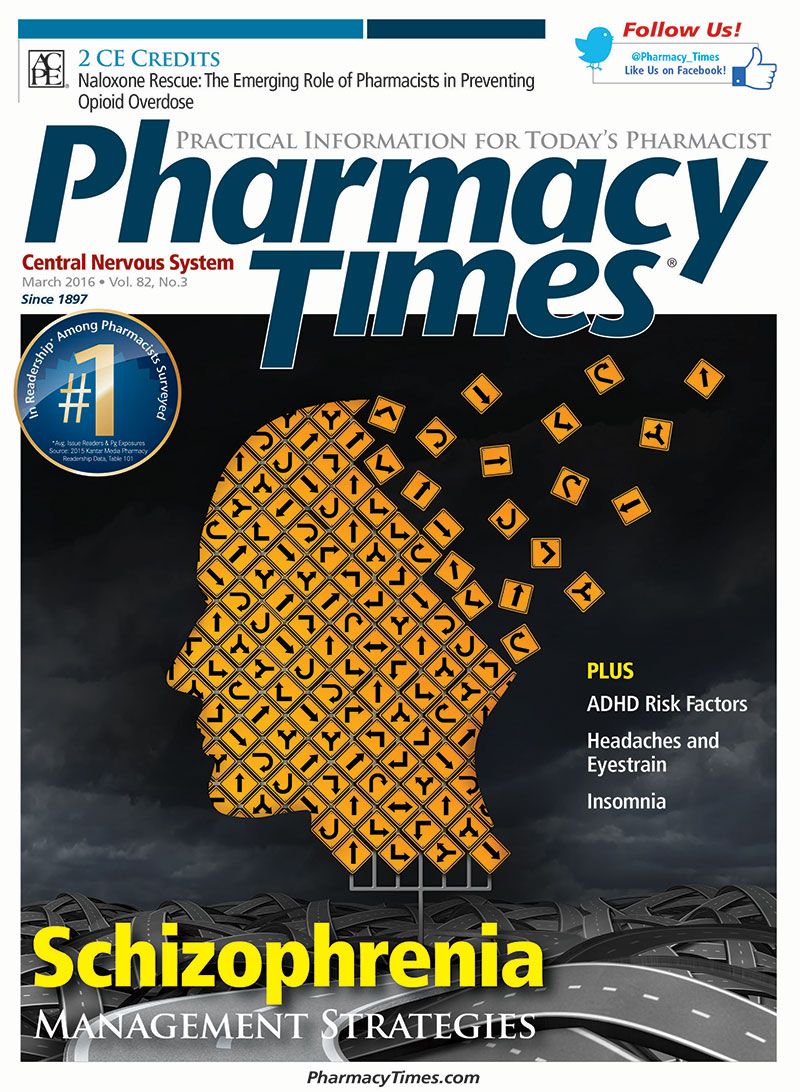
Publication
Article
Pharmacy Times
Self-Care for Disorders Related to the Central Nervous System
Which OTC products should these pharmacists recommend?
CASE 1: EPILEPSY, ANTIEPILEPTIC MEDICATIONS, AND BONE HEALTH
A 40-year-old man presents to the pharmacy seeking advice on the use of vitamin D. He has a history of epilepsy, for which he has been prescribed, and adherent to, phenytoin therapy for decades. He reports a recent fall and wrist fracture, for which his primary care provider (PCP) recommended further screening and evaluation for osteoporosis, because of his long-term use of phenytoin. The patient would like a recommendation for a calcium and vitamin D supplement because he read that it can slow the progression of bone disease. What can the pharmacist suggest regarding supplement use in this individual?
ANSWER
Beyond seizure control, osteoporosis and support of bone health are other important considerations for patients with epilepsy. Long-term use of antiepileptic medications, including phenytoin, carbamazepine, primidone, and phenobarbital, may predispose individuals to bone metabolism disorders. The effect of these drugs on skeletal structure are multifactorial: Antiepileptic drugs reduce conversion of vitamin D to its active forms, resulting in lower serum levels and, in turn, reduced serum calcium and phosphorus levels, and an increased parathyroid hormone level.1 Unlike calcium and vitamin D supplementation recommendations for postmenopausal women, there are no specific guidelines for this supplementation in individuals with epilepsy. In this population, one clinical trial failed to demonstrate reduced fracture risk with the use of calcium and vitamin D supplementation.2 Because this patient recently experienced a fracture, underscore the importance of his following up with his PCP for further evaluation of his bone health. Prescription medications may be warranted. Recommend that he at least follow national dietary guidelines, for his age and sex, for calcium (1000 mg per day) and vitamin D (600 IU per day), in the interim.3
CASE 2: HEADACHE RELIEF
A 36-year-old pregnant woman approaches the pharmacist seeking a recommendation. She has suffered from headaches intermittently throughout her life, and she believes they are associated with emotional stress and fatigue. To treat her headaches prior to becoming pregnant, she would take an ibuprofen preparation. Now that she is pregnant, however, she is not sure what the best treatment option is and has not yet spoken to her obstetrician about what is safe to use. She has no known allergies or chronic conditions and takes only a prenatal vitamin once daily. What recommendations should the pharmacist provide?
ANSWER
Headaches are common among pregnant women and can be attributed to numerous physiologic changes, including increased blood volume, hormonal fluctuations, stress, poor sleep, and inadequate hydration. Nonpharmacologic strategies, for preventing headaches or alleviating them without medication, include practicing stress management; ensuring adequate nutrition, hydration, and sleep; avoiding eyestrain; and applying something hot or cold to the affected area, depending on the type of headache.4 Use of nonsteroidal anti-inflammatory drugs (NSAIDs) to relieve headaches is preferred by many individuals. However, pregnant women should only take NSAIDs under physician supervision. Educate this woman on headache trigger avoidance measures and occasional use of acetaminophen for relief. Encourage her to follow up with her obstetrician for further recommendations.
CASE 3: HERBAL SUPPLEMENTS FOR ANXIETY
A 33-year-old woman comes to the pharmacy looking for a recommendation on whether to purchase a dietary supplement. She just started a new job and wants to ensure she is making a good impression on her new employer. She reports having difficulty falling asleep each night, which she believes is related to her stress level. A friend recommended she try an OTC supplement called kava-kava, but the patient would like a professional opinion before she spends money on it. She has no significant medical history, has no known allergies, and takes only an oral hormonal contraceptive each day. She would like the pharmacist’s opinion on the use and safety of kava-kava for alleviating her anxiety and helping her sleep. What advice would be reasonable to share with this patient?
ANSWER
Kava, or kava-kava, is an herbal medicine that has been used since antiquity in beverages, rituals, and medicines. It has been used as an anxiolytic and has been found to have anxiolytic and stress-relieving properties.5 It is important to educate this woman on the adverse effects (AEs) and safety concerns of kava to allow her to make an informed decision on whether to purchase it. Safety concerns associated with kava include potential sedation, which has been reported anecdotally, and in the literature. The sedative effect can be enhanced by concomitant use of other sedating medications. Serious AEs associated with kava, including liver toxicosis or failure, prompted the FDA to warn consumers to avoid kava products if they have liver disease or to seek medical attention if symptoms of liver dysfunction develop, including jaundice, brown urine, light-colored stools, tiredness, and loss of appetite.5,6
CASE 4: TREATING VERTIGO
A 57-year-old man wants to speak to the pharmacist about an OTC product. The patient describes waking up this morning and “feeling like the room was spinning.” He never experienced this before and indicates that his symptoms have improved throughout the day, but they have not completely resolved. He has a medical history of diabetes mellitus and hypertension, for which he takes metformin, pioglitazone, and hydrochlorothiazide. He reports he adheres to his medication regimen. Although he self-monitors his blood glucose level infrequently, he did check it when this event occurred, and it was normal. He would like to know if there is a medication available, without a prescription, to alleviate his vertigo. What recommendations or education should the pharmacist offer?
ANSWER
Vertigo (the sensation of movement or spinning) can be attributed to numerous physical factors and conditions, but often to a problem with the inner ear.7 OTC meclizine, an anticholinergic medication, is indicated for managing dizziness due to nausea and vomiting associated with motion sickness. Prescription meclizine is indicated for vertigo related to conditions affecting the vestibular system of the inner ear.8 Specifically, this agent works to reduce stimulation of the middle ear labyrinth by cholinergic impulses. The adverse effects of meclizine and other anticholinergic medications include sedation, blurred vision, urinary retention, and dry mouth.9 Based on this patient’s medical history and medication regimen, his symptoms could be manifestations of low blood pressure or electrolyte abnormalities. More serious underlying causes cannot be ruled out. In this case, triage this patient to his primary care provider.
Got an interesting question regarding OTC medications? Contact the authors at [email protected] and share the details. Your case could be featured in an upcoming column!
Dr. Bridgeman is a clinical associate professor at the Ernest Mario School of Pharmacy, Rutgers University, and an internal medicine clinical pharmacist at Robert Wood Johnson University Hospital in New Brunswick, New Jersey. Dr. Mansukhani is a clinical assistant professor at the Ernest Mario School of Pharmacy, Rutgers University, and a transitions-of-care clinical pharmacist at Morristown Medical Center in Morristown, New Jersey.
References
- Pack AM. The association between antiepileptic drugs and bone disease. Epilepsy Curr. 2003;3(3):91-95.
- Espinosa PS, Perez DL, Abner E, Ryan M. Association of antiepileptic drugs, vitamin D, and calcium supplementation with bone fracture occurrence in epilepsy patients. Clin Neurol Neurosurg. 2011;113(7):548-551. doi: 10.1016/j.clineuro.2011.03.011.
- Dietary reference intakes: estimated average requirements and recommended intakes. United States Department of Agriculture. fnic.nal.usda.gov/sites/fnic.nal.usda.gov/files/uploads/recommended_intakes_individuals.pdf. Accessed January 12, 2016.
- Tobah YB. What can I do about headaches during pregnancy? I’d rather not take medication. mayoclinic.org/healthy-lifestyle/pregnancy-week-by-week/expert-answers/headaches-during-pregnancy/faq-20058265. Accessed January 12, 2016.
- Kava monograph. In: Natural Medicines Comprehensive Database [Internet]. Stockton, CA: Therapeutic Research Faculty; c1995-2016 [cited January 12, 2016]. www.therapeuticresearch.net.
- Consumer advisory: kava-containing dietary supplements may be associated with severe liver injury. FDA website. www.fda.gov/Food/ResourcesForYou/Consumers/ucm085482.htm. Accessed January 12, 2016.
- Vertigo. webmd.com/brain/vertigo-symptoms-causes-treatment#1. Accessed January 12, 2016.
- Antivert (meclizine) [package insert]. New York, NY: Pfizer, Inc; 2012. labeling.pfizer.com/ShowLabeling.aspx?id=521. Accessed January 12, 2016.
- Ferreri SP, Welch AC. Nausea and vomiting. In: Krinsky DL, Ferreri SP, Hemstreet BA, et al, eds. Handbook of Nonprescription Drugs: An Interactive Approach to Self-Care. 18th ed. Washington, DC: American Pharmacists Association; 2015:311-327.

2 Commerce Drive
Cranbury, NJ 08512
All rights reserved.





